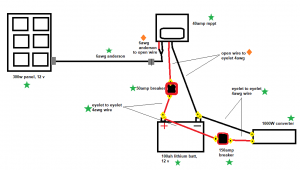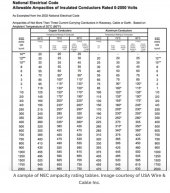Hi everyone,
This is my first attempt at a DIY portable solar system. Im starting small and basic, dont need to run a lot on it and I dont plan to be offgrid for more than a few days at a time.
- Not using a vehicle to charge the system, only solar input
- This is my current planned build so far (please excuse the rough sketch). My biggest head scratching points so far have been with the wiring and breakers.
- I also got a battery box but im now unsure if using this will be easier, or if wiring it up manually will be easier. I purchased with the idea of using anderson plugs for the entire portable setup but a lot of MPPT devices dont come prewired with anderson plugs... PLUS where would the breakers go if i did this?
- How badly do i need breakers for a setup this size at all?
- Im also not having much luck finding the items with the orange diamond, but everything else I have sourced
Any advice much appreciated! Any changes I need to make?
I dont really mind if it's not the best, I just dont want anything to set on fire haha.
Solar blanket: https://tinyurl.com/fjwrj8bv
MPPT: https://www.australiandirect.com.au/buy/kickass-mppt-solar-controller-40a/KA1224MPPT40A
Lithium Battery: https://outbax.com.au/voltx-12v-100...y-lifepo4-deep-cycle-recycle-camping-rv-solar
Converter: https://www.edisons.com.au/genpower...verter-caravan-boat-carplug/?___store=default
Battery box: https://tinyurl.com/yzy5akt5
Breaker: https://offroadliving.com.au/products/circuit-breakers?variant=30607276441718

This is my first attempt at a DIY portable solar system. Im starting small and basic, dont need to run a lot on it and I dont plan to be offgrid for more than a few days at a time.
- Not using a vehicle to charge the system, only solar input
- This is my current planned build so far (please excuse the rough sketch). My biggest head scratching points so far have been with the wiring and breakers.
- I also got a battery box but im now unsure if using this will be easier, or if wiring it up manually will be easier. I purchased with the idea of using anderson plugs for the entire portable setup but a lot of MPPT devices dont come prewired with anderson plugs... PLUS where would the breakers go if i did this?
- How badly do i need breakers for a setup this size at all?
- Im also not having much luck finding the items with the orange diamond, but everything else I have sourced
Any advice much appreciated! Any changes I need to make?
I dont really mind if it's not the best, I just dont want anything to set on fire haha.
Solar blanket: https://tinyurl.com/fjwrj8bv
MPPT: https://www.australiandirect.com.au/buy/kickass-mppt-solar-controller-40a/KA1224MPPT40A
Lithium Battery: https://outbax.com.au/voltx-12v-100...y-lifepo4-deep-cycle-recycle-camping-rv-solar
Converter: https://www.edisons.com.au/genpower...verter-caravan-boat-carplug/?___store=default
Battery box: https://tinyurl.com/yzy5akt5
Breaker: https://offroadliving.com.au/products/circuit-breakers?variant=30607276441718




